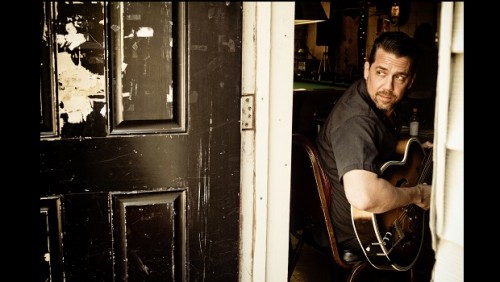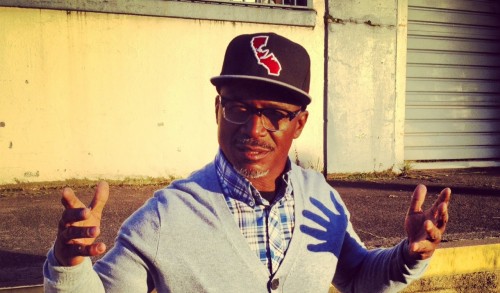By Michael Lello
Some of the greatest artists of our time have thrived at a confluence of various musical rivers rather than following the path of just one singular stream. Their influences are so commingled that, despite their authenticity, the source material is not blatantly discernible.
Growing up the son of a finger-style guitarist with a robust folk music record collection, and later turning his ear toward everything from bluesmen like Lightnin’ Hopkins to hardcore punk and even 1980s pop metal, Patrick Sweany, not surprisingly, is a guitarist and singer who is equally at home playing solo acoustic sets or full-band blues shows; connecting with an intimate audience at a small venue like Scranton’s Tripp House or in a bigger setting opening up for famous friends The Black Keys; or even kicking around some old-school country tunes with a cast of Nashville ringers at The Five Spot, a bar in “the Music City.”
For Sweany, who will perform at Faces and Voices of the Blues III at the aforementioned historic Tripp House on Saturday, Oct. 4, it doesn’t really matter what town, what venue or what configuration he happens to be locked into at the moment, because his mission is always simple, and it’s always the same: to entertain.
“I don’t think about it much, because I know everyone there is an audience member, and they have to be reached, and it’s my job to reach them, no matter what environment I’m playing in,” says Sweany, speaking by phone to Highway 81 Revisited after dropping off a rental van following a long tour trek from Denver back to home base in Nashville. “That’s really what I think about the most.”
Faces and Voices III is presented by PocoNotes – Dolores Hippler and Pat Harper. The duo, which have presented a slate of unique shows in sometimes atypical venues in Northeastern Pa. and the surrounding area since 2006, met Sweany when he was teaching guitar at the Fur Peace Ranch, a musicians’ workshop camp run by Jorma Kaukonen of Jefferson Airplane and Hot Tuna fame.
While Sweany says it does not matter where he plays, he recognizes the efforts of the PocoNotes crew in bringing artists of a certain pedigree to a market like NEPA.
“That’s wonderful,” he said of the PocoNotes mission. “I love being able to really connect with an audience intimately. That’s when music is most social.”
 Last year, Sweany released “Close To The Floor,” his most recent album. He says “a good deal of the writing came out of some very tragic events in my wife’s family and our family together, so a lot of the material was about me getting through that.”
Last year, Sweany released “Close To The Floor,” his most recent album. He says “a good deal of the writing came out of some very tragic events in my wife’s family and our family together, so a lot of the material was about me getting through that.”
“It wasn’t an easy process. Trying to tell those stories and tell them truthfully was really important to me as a writer,” says Sweany, originally from Ohio.
The album shares more sonic kinship to the pre-rock era than the prevailing sounds of modern rock and even current blues. That was by design, of course; Sweany recorded “Close To The Floor” on 16-inch, two-track tape, and he and the other musicians recorded it live, not in the typical one-instrument-at-a-time overdub style that has become standard.
“I’ve heard a lot of great records recorded in numerous ways,” Sweany explains. “For Patrick Sweany as a guy, I felt like it had to be old-school. It’s always been sort of my artistic approach, for lack of a non-pretentious way of saying it, to do that and make it sound new.”
Sweany laughs, adding: “I should be wearing a beret and smoking a clove cigarette while saying that.”
The resulting record drew plaudits from Rolling Stone, who called him a “soon-to-be legendary guitar man,” while Esquire, which premiered the single “Working For You” on its website, said “This is the kind of music Robert Johnson sold his soul way back when – and Sweany is pouring his into it.” Sweany also played the vaunted Newport Folk Festival after the album’s release.
When Sweany’s current string of shows winds down, he’ll enter what he jokingly called his “song dungeon” and get to work on the next album. What form that release takes, he’s not sure yet – he says he feels it might take “an acoustic direction,” but adds “you never know until tape hits the magnet.”
Sweany has toured with heavy hitters like the Tedeschi Trucks Band, whom he praises as “absolutely, without question, the nicest people in the business,” Sonny Landreth and Ohio’s The Black Keys. In fact, one-half of the Akron-based arena-filling duo, Dan Auerbach, was in Sweany’s band before he founded the Keys with drummer Patrick Carney. Auerbach has produced two of Sweany’s albums, most recently 2007’s “Every Hour Is A Dollar Gone.”
 The two met when Chuck Auerbach, Dan’s father, brought the future Black Key to Sweany’s Monday night residency. They played together and realized they shared common musical ground. “He turned me on to T Model Ford and he was into Fred McDowell. We would turn each other on to things,” Sweany says.
The two met when Chuck Auerbach, Dan’s father, brought the future Black Key to Sweany’s Monday night residency. They played together and realized they shared common musical ground. “He turned me on to T Model Ford and he was into Fred McDowell. We would turn each other on to things,” Sweany says.
Auerbach started a band called The Barnburners, played in Sweany’s band, then “he started The Black Keys and suddenly he got real busy,” Sweany said, laughing. The Keys are now one of the bigger names in rock, having won seven Grammy awards and reaching the top of the Billboard album chart with their newest album, “Turn Blue.”
Sweany’s recorded output is no less substantial. And the fruits of that labor are indeed an important and well-received aspect of his career. But he is clear that working in the studio is an extension of his stage show.
“I always, always, always wanted to be an entertainer, so performing live has always been the focus of my thing,” he says.
For more information on Faces and Voices of the Blues III, visit PocoNotes.com.
Highway 81 Revisited is a media sponsor of Faces and Voices of the Blues III.




Leave a Reply